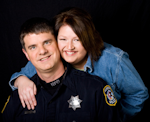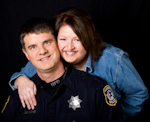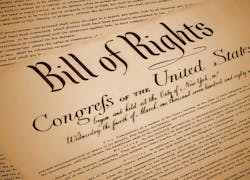Is The 1st Amendment Impacting How We Police?
Congress shall make no law respecting an establishment of religion, or prohibiting the free exercise thereof; or abridging the freedom of speech, or of the press; or the right of the people peaceably to assemble, and to petition the Government for a redress of grievances.
- First Amendment of the United States Constitution (you know, just in case you didn’t recognize that)
- - - - -
The absolute foundation of our free society, arguably perfected (if occasionally debated, or subject to hiccups) in the crucible of the American experiment, and having become a model for many other nations to aspire as 20th Century democracy succeeded Old World order monarchical rule, fought through the rise of totalitarianism, and ultimately – if incompletely – triumphed, the First Amendment stands sacrosanct. When most people speak of “Freedom” in the United States, this is ultimately what they mean. It’s not that the other nine of the Bill of Rights aren’t important and, as freedoms go, all ensure equally vital rights, but their extent and limits have often been, and continue to be, subject to far greater contention than the First. It is the First Amendment, in fact, that protects the very debate around the extent and limits of each.
There exists a growing challenge to what has long been the accepted extent of the First Amendment, however, and the response and traction it’s gaining feeds its spread. That law enforcement will be sucked into the debate, called upon to enforce reactionary policies (and possibly laws) designed and implemented to placate a relatively small but militantly vocal collection of opponents of the largely unfettered free speech to which we’re accustomed, is inevitable. In fact, it’s happening already and if you haven’t yet found yourself called to mediate one of these disputes you surely will be.
The most highly publicized instances where free speech rights have been challenged and even limited have been on college campuses. Examples of assaults on free expression at private institutions, and even long-accepted first amendment protections on public campuses, are more and more common: angry students shutting down events where a speaker or speakers whose real or perceived views they disagree with, including commencement speeches and talks having absolutely nothing to do with the controversy of the speakers beliefs, has been a recurring theme; speech codes and consequences for expressing unpopular or provocative opinions, counterpoints, or jokes are increasingly popular with administrators eager to head off controversy; comedians refusing to play college campuses – once a popular and lucrative way of honing material, gaining recognition, and wooing a potential fan base – because hypersensitivity to comedy’s natural need and duty to push limits in the interest of social commentary is as likely to provoke rage as laughs; the rise of taking deep offense to innocent “microaggressions” has built walls between the aggrieved and those who “should have just known better” with little chance of constructive dialogue; and challenges to the long-standing academic freedom enjoyed by instructors, including tenured faculty, that can end a career.
It should be emphasized that the actual number of challenges to free expression and the First Amendment are likely miniscule in scope when viewed with a wider perspective; media zeros in on these instances precisely because they are newsworthy and of particularly special concern to the media that relies on First Amendment protections, while most students and academics are still supportive of and committed to protected expression in general, even if they may advocate for greater specific limits in the interest of protecting feelings or preventing offense, or mistakenly believe such limits already exist.
The advocacy for increased limits on speech has extended even beyond the campus and into “the real world” where, truth be told, it has always existed at some level. Free speech and what should be allowed and limited, like any other aspect of a free society, is open to debate, challenge, and judicial review. In a nation of over 326 Million, absolute consensus is impossible and there are plenty of people willing to push back at even clearly established protections and try and use law enforcement as their means.
Complaints of “The Extended Middle Digit” (aka: “The Finger” or, for reasons lost to history but living on colloquially, “The Bird”) tossed up in moments of road rage or other disputes are frequent complaints to police departments everywhere. For whatever reason, this really very harmless gesture often prompts outrage in its recipient, leading to angry 911 calls and demands for justice!
And plenty of cops are more than happy to oblige, forgetting (or maybe having never been taught) that this silent if effectively symbolic expression of “F**k You!” is constitutionally protected speech! (For a finely detailed and heavily footnoted, but peculiarly entertaining, read on the matter, try out Ira P Robbins’s “Digitus Impudicus: The Middle Finger and the Law”. At a mere 83 pages it is just right for a bit of light beach fare)
The problem is that complaints about protected speech don’t stop there. Lawful protest is both protected and an integral part of our national DNA, but countless Americans are yet to get the memo. A union picket line, anti-abortion protest, political rally, or any number of situations people might gather and unite their voices in protest is sure to raise hackles and light up dispatchers’ lines. Confusion over the civil, as opposed to criminal, nature of slander and libel still confuses many. And increasingly, expression viewed as “hate speech” is seen as an exception from First Amendment protections by some, and the idea that real harm can emanate from mere offense is gaining traction. Hate speech is separate from a hate crime, however, and, in and of itself, is still protected even when it is objectively vile. It is critical for all police officers to avoid getting sucked into the wrong side of this debate, constitutionally speaking, or to act in the interest of just doing something! when someone complains about actions that meet the criteria of speech or expression, no matter how offensive they may agree it is. It is critical that young officers, some who may not be as in tune with freedoms the rest of us take for granted or have been raised with the idea there is criminal liability for giving offense, be educated.
As we celebrate our independence and the freedoms guaranteed us this July 4th, remember that the Bill of Rights exists not to reflect humankind’s most base instincts when it comes to the rights of others, but to reign them in. To stifle and punish that which discomfits us is our reflex; the Bill of Rights, including the First Amendment, protects us from our own worst reflexes for the benefit of all. And police officers are called upon to stand as the first line against reflexive abuse by defending and explaining what it means.

Althea Olson
Althea Olson, LCSW and Mike Wasilewski, MSW have been married since 1994. Mike works full-time as a police officer for a large suburban Chicago agency while Althea is a social worker in private practice in Joliet & Naperville, IL. They have been popular contributors of Officer.com since 2007 writing on a wide range of topics to include officer wellness, relationships, mental health, morale, and ethics. Their writing led to them developing More Than A Cop, and traveling the country as trainers teaching “survival skills off the street.” They can be contacted at [email protected] and can be followed on Facebook or Twitter at More Than A Cop, or check out their website www.MoreThanACop.com.

Michael Wasilewski
Althea Olson, LCSW and Mike Wasilewski, MSW have been married since 1994. Mike works full-time as a police officer for a large suburban Chicago agency while Althea is a social worker in private practice in Joliet & Naperville, IL. They have been popular contributors of Officer.com since 2007 writing on a wide range of topics to include officer wellness, relationships, mental health, morale, and ethics. Their writing led to them developing More Than A Cop, and traveling the country as trainers teaching “survival skills off the street.” They can be contacted at [email protected] and can be followed on Facebook or Twitter at More Than A Cop, or check out their website www.MoreThanACop.com.



